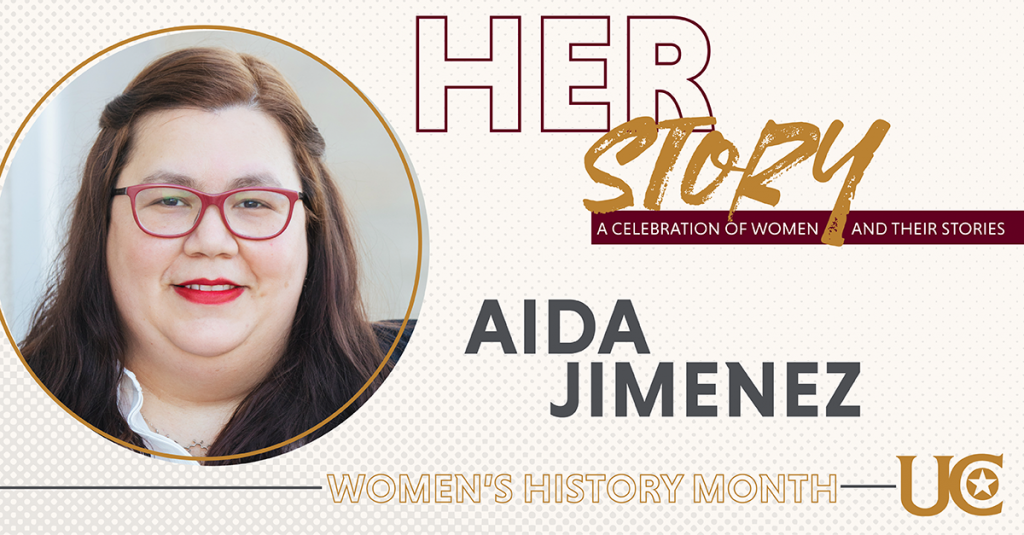HERstory | Aida Jimenez

Aida Elisabet Jimenez Esquilin is the Biology Program Director at the University of Charleston
I am an Associate Professor of Biology at the University of Charleston and my STEM story began in 10th grade when I won the school science fair and entered to participate in the regional fair in Puerto Rico. I won second place and this project started my life-long love affair with the field of microbiology. I did my graduate work both at the University of Colorado (2003) where I studied antifungal producing bacteria in soils funded by the U.S. Army and at Colorado State University (2006) where the U.S. Forest Service funded my project to study the effects of fire, as well as other forest soil management techniques such as scarification, on soil microbial communities over time. My Post-doctoral work brought me to West Virginia, where I studied microbial communities of silvopastoral systems for the USDA. Even though I loved research, I surrendered to the teaching bug I had always carried with me, like most women in my family did, and began my higher education career in 2008.
I think of inspiration as something or someone that stimulates my mind, so I usually do not like to answer the question of “who” has inspired me most because I always find inspiration in every person I meet, even in the most mundane of interactions. But the first memory I have of an inspiring woman in my life is of my mother, Esther, a history high school teacher who instilled in me and my brothers a great work ethic and the intrinsic value of learning. Even though I credit her reading to me in the womb for my intense curiosity and love of reading and learning, she made sure my life was rich in many other ways. For example, she instilled a great appreciation for art as an essential human need as important as any other way of knowing. Her father and brother (my grandfather and uncle) were visual artists, and they come from a long line of artisans on the island. So, for us kids, she always made sure there was constant art and craft making in the house. It was our preferred way of engaging with each other. To that, she added regular museum visits and art classes after school and on the weekends. And even though I chose science as my preferred way of knowing instead of art, I credit my relationship to art for any creativity I have which spills over my science work constantly. Growing up, I also appreciated how making art also helped me to challenge my certitudes which later I realized was a very important trait in science. Based on those personal experiences with art nurtured by my mother, today I am an ardent advocate of including art as a means of inquiring into the natural world (STEAM).
If I think about other women who have inspired me, I must mention my Master’s and Doctoral advisors Dr. Timberly Roane at the University of Colorado and Dr. Mary Stromberger at Colorado State University, respectively, who were both great examples of women in the sciences who accomplished everything they set for themselves (the great career and the fulfilled personal life) with great dignity and fierceness. I learned not only microbiology from them, but they helped me realize early on in my career that for women in science the choices to be a mother or be child-free were both perfectly acceptable viable choices. This was a huge realization for me and even though motherhood ultimately was not the path for me, it was such a relief to see what was possible. These women empowered me to be the best scientist I could be always with kindness, so I am left with no other way that to pay it forward with my own students. I only hope I can be a good a role model for mine.
Finally, a great deal of inspiration in my life came from a woman whose name I do not even know. She was a graduate student in the same environmental microbiology lab I worked in as a sophomore at the University of Puerto Rico. While there, I heard her conversation with another student about how one does not need to have a genius IQ to work on a doctorate, and that the most important thing was to be curious and motivated. I was in awe of her, and she was said this as the most normal cool person there was. That was the moment I knew I could get my doctorate. All the sudden, science was not this arcane thing only a few select get to understand and do (well, maybe quantum physics is) but she made me see it as an attainable goal… the rest is herstory, and my story.
Inspiration can come from anywhere, from someone close to someone you do not even know. I am always constantly inspired by the women I work with at UC, too many to list here, who every day give 100% for our students and inspire me to give my best also. I am also constantly inspired by my students who I chose to be partners in learning with every day. As a final thought: A special shout out to those first-generation Appalachian female students in the sciences who are being the first in their families to form a new legacy. You all inspire me. Thank you.